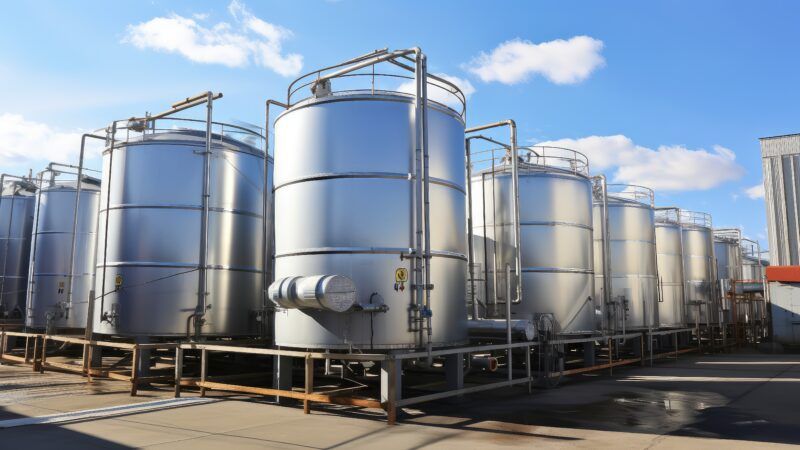Energy Department Turns Ordinary Gasoline Sale Into Major Announcement
Congress forced the government to sell gasoline from the Strategic Petroleum Reserve, an obligation the Biden administration is now bragging about fulfilling.

On Tuesday, the U.S. Department of Energy (DOE) announced that it would sell 1 million barrels of gasoline, equaling 42 million gallons, from the Strategic Petroleum Reserve (SPR) ahead of July 4. A DOE press release said the sale would largely impact "the states of Maine, New Hampshire, Vermont, Massachusetts, Connecticut, Rhode Island, New York, New Jersey, and Pennsylvania."
"The Biden-Harris Administration continues to take strategic action to lower prices for American consumers in every aspect of their lives—especially as summer driving season ramps up," said DOE Secretary Jennifer Granholm. "By releasing this reserve ahead of July 4th, we are ensuring sufficient supply flows to the Northeast at a time hardworking Americans need it the most."
But the sale was not some magnanimous gesture—in fact, it was required by law. And it's hard to see how the act will make much of a difference, unless the goal is to shore up President Joe Biden's flailing reelection bid.
Section 308 of the 2024 Consolidated Appropriations Act mandated that "the Secretary of Energy shall draw down and sell one million barrels of refined petroleum product from the Strategic Petroleum Reserve during fiscal year 2024" and then "carry out the closure of the Northeast Gasoline Supply Reserve." For the DOE to brag about this sale, "the administration is claiming credit for a policy enacted by Congress," says Peter Van Doren, senior fellow at the Cato Institute.
The Northeast Gasoline Supply Reserve was established in 2014. After Hurricane Sandy caused damage to refiners in 2012, leading to fuel shortages across New York, DOE then-Secretary Ernest Moniz authorized the department to set aside 1 million barrels of gas for future emergencies. (The SPR was itself created in 1975 to hold crude oil, after that decade's oil embargoes, to provide a backstop against future supply shocks.)
But "storing refined fuel is costlier than storing crude oil," Reuters noted in May, so Congress shuttered the reserve in its 2024 spending bill.
Not only is the sale a requirement under federal law, but 1 million barrels of gas will just be a literal drop in the bucket.
According to the Energy Information Administration, American motorists consumed just under 9 million barrels of gasoline per day in 2023, surpassing 9 million barrels per day in May, June, July, and August. "The Northeast and Mid-Atlantic regions accounted for roughly 2.5 million barrels," Van Doren tells Reason. As a result, 1 million additional barrels constitutes just 40 percent of the targeted region's supply for a single day.
And gas prices were already falling: On Tuesday, the day of the DOE announcement, GasBuddy reported that this year would see lower gas prices than any other July 4 holiday during Biden's presidency. In May, Reuters noted that the DOE "will be selling into a well-supplied market," crediting "higher refinery output and weak fuel demand" for healthy supply and lower prices.
Still, Biden's political opponents have accused the president of manipulating gasoline stock for political advantage.
Speaking to reporters in May, former President Donald Trump said Biden was releasing the fuel "in a bid to lower prices at the pump just before the election….Prices are higher than they've been in a long time, they're very high, and so he's trying to stop that because high gasoline prices are not good for elections."
"Under the Biden administration, the SPR has been abused for political purposes to try and bring down record high gasoline prices," charged Rep. Cathy McMorris Rodgers (R–Wash.) and Sen. John Barrasso (R–Wyo.) in a letter to Granholm in May. "We urge you, in the strongest terms, to put this country's energy security first and stop abusing the SPR for political purposes."
Unfortunately, manipulating the SPR for political purposes is a time-honored tradition. In 2000, former President Bill Clinton released 30 million barrels of oil from the SPR just weeks before the 2000 election in which his vice president, Al Gore, was a presidential candidate. Gore's opponent George W. Bush criticized the move, saying the SPR "should not be used for short-term political gain at the cost of long-term national security." Then in 2006, Bush suspended deposits into the reserve to boost supply in the face of rising gas prices, ahead of that year's midterm elections.
In his 2017 budget proposal, Trump proposed selling half the oil in reserve to reduce the federal budget deficit, before announcing in 2020 that the government would buy crude to bail out oil companies suffering from the onset of the COVID-19 pandemic.


Show Comments (27)